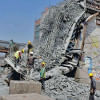The democracy vs development debate

A dichotomy can be defined as the presence of two alternatives that are jointly exhaustive (only these two alternatives, and no more than these two, exist) and mutually exclusive (the existence of each alternative excludes the other). A false dichotomy arises when a dichotomy is believed to exist when in reality, it does not—there are either more than two alternatives or the alternatives are not mutually exclusive. The recent advocacy by some for the argument that Bangladesh needs development before democracy fits this textbook definition of a false dichotomy remarkably well.
The proponents of the development before democracy argument contend that Bangladesh may have to make some "pragmatic" compromises with the "utopian" ideal of democracy. After all, people need food before they need rights, and getting the economy in good order is much more important than a purportedly good system of governance. However, many people may not know or realise that this line of thinking is hardly new; it is something that the people of Bangladesh has heard and defeated before, say about fifty years ago, when we were part of a certain country called Pakistan, and was ruled by a certain military dictator named General Ayub Khan. This idea rests on certain premises, all highly questionable, if not patently false.
The first premise is that certain conditions must be present, such as a well-educated citizenry, certain institutions, a "culture of tolerance," etc., before a country can have democracy. This premise has a fatal flaw. It ignores the very foundational character of democracy. Democracy is not simply a system of government run by elected representatives of the people. Democracy can be viewed as an arrangement, a social contract if you will, by which a nation agrees to live together and be governed by a set of principles, rules and institutions. Of course, there can be other arrangements, such as a monarchy, a dictatorship or an oligarchy by which a nation can also live together and be governed. The critical difference between democracy and the other systems of government is that the former is based on the consent of the people and the latter are not. This makes democracy the best foundation, if not the only workable foundation, on which the entire edifice of a modern nation can be built. Moreover, with the consent of the people as its defining principle, democracy has a moral legitimacy that other systems of governance lack. If we accept the proposition that democracy is foundational, then it needs neither any preconditions, such as a well-educated citizenry, nor is obligated to produce any agreeable consequences, such as economic development, for its justification.
The second premise for the anti-democratic argument hinges on the purported need for political stability for economic development. Such stability, the argument goes, can be better achieved under an authoritarian regime rather than in a democracy. Both prongs of this premise, that economic development is unachievable without political stability, and stability, in turn, is unachievable under democracy, are utterly flawed. For most of its 46-year history, Bangladesh has experienced very little political stability. Yet, Bangladesh has seen remarkable economic development over half of its history, which shows that the need for stability for development might be over-stated. Also, it is not clear that stability cannot be achieved under democracy. It is true that an autocracy can achieve some measure of stability, but only in the short run. It is not long before an autocrat will stumble. Such disruptive events are not exactly conducive to stability. Democracy, on the other hand, tends to experience instability during its formative years. Over the long-term, as democracy matures, the polity becomes increasingly more stable. This is not just an appealing proposition but is borne out by empirical evidence. Let us try the following exercise: rank three countries, namely Bangladesh, Pakistan and India, in order of their practice of democracy, and then rank them in order of their experienced political stability. I think it should be obvious to any sensible person that the country that experienced the most democracy, that is India, also experienced the most stability. Not surprisingly, the country that experienced the least democracy, namely Pakistan, also experienced the least stability.
Finally, the false premise that takes the medal for its inanity is that "western" democracy is not suitable for non-western countries, because of the differences in culture, social structures and histories. Another variant of this view is that western democracy needs to be tailored into some form of a quasi-autocracy to suit the "culture" of a country. To paraphrase Ayub Khan, Pakistan needed a democracy "suited to the genius of its people." It is reasonable to recognise that the overarching idea of democracy does need to adapt to a country's cultural and other idiosyncrasies. This adaptation, however, cannot be such that it defeats the very essence of the idea of democracy as a system of self-governance. In recent history, many dictatorships or quasi-dictatorships, attempted to deprive the people of the right to self-governance while disingenuously claiming to make this kind of adaptation. Ayub Khan's "basic democracy" is perhaps one of the most embarrassing examples of foisting such an illusion of democracy on an unsuspecting people.
The state, based on the modern person's understanding of a morally just society, has no raison d'etre if it does not draw its legitimacy from the will of the people. Democracy is the only system of government that has such legitimacy. The best way forward for Bangladesh is to strive to build and strengthen democracy and concurrently pursue economic development and other goals, which can lead to a virtuous cycle of continuously improving democracy and at the same time, making sustainable progress toward achieving a prosperous and just society.
M Harun uz Zaman, PhD is an energy industry and policy specialist, writing from Columbus, Ohio, USA.

 For all latest news, follow The Daily Star's Google News channel.
For all latest news, follow The Daily Star's Google News channel. 








Comments